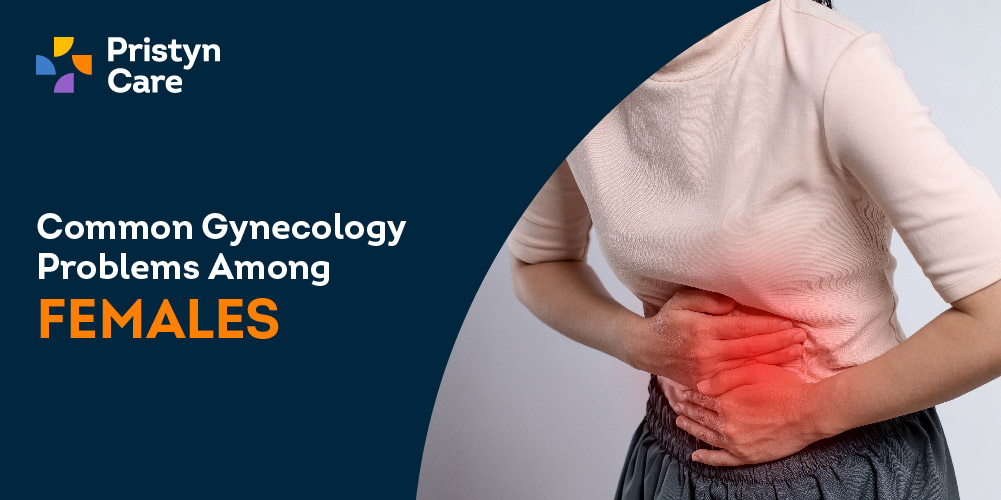
Females experience various gynecological issues in different phases of life such as pre-menstruation, pregnancy or menopause. Consultation with a gynecologist will help to prevent the most dreaded gynecological conditions and diseases and maintain a healthy life ahead.
Below are some common health issues to give you a glimpse of how the issues impact a female. Working with a gynecologist on experiencing such conditions is important for the female’s well-being.
Table of Contents
Menstrual Disorders
Heavy or prolonged periods, bleeding after intercourse, spotting instead of periods or bleeding between periods, and painful period cramps can be signs of a menstrual disorder in females of menstruation age. A female can treat this condition with timely treatment by a gynecologist.
Vaginal itching and infections
Vaginal infections are very common among females, especially if they are sexually active. Vaginal infections can cause symptoms like vaginal discharge, itching, pain during sex, discomfort, and vaginal odor. However, these symptoms do not always indicate an infection. It is important for a female to consult a gynecologist for such symptoms and undergo proper treatment in order to eliminate the infection.
Painful sex
Many females experience painful intercourse at some point in their lives. Painful intercourse or dyspareunia is the persistent or recurrent pain in the genitals that occurs just before, during, or after sex. If a female has dyspareunia (painful intercourse), she might feel:
- Pain while penetration or while inserting a tampon
- Deep, sharp pain during thrusting
- Burning pain and itching while peeing
- Throbbing pain after intercourse
If you have recurrent pain during or after sex, talk to your gynecologist.
Also Read- How to have sex without pain – Home remedies for painful sex
Abnormal uterine bleeding (AUB)
Abnormal uterine bleeding is irregular bleeding from the uterus which is longer and/or heavier than the usual or heavy bleeding between periods. AUB has many causes such as hormone levels, growths in the uterus, or clotting problems. In some cases, the cause of abnormal uterine bleeding is not known. The timely treatment has positive results for ovulation and the chances of getting pregnant.
Also Read- Hysteroscopy for Abnormal Bleeding
PCOS

PCOS is a common hormonal disorder among females, affecting 1 out of 10 females. The most common cause of PCOS is excessive insulin or androgen in the body or genetic causes. Females suffering from PCOS may experience obesity, acne, abnormal hair on the face, neck, abdomen or back, higher risk of diabetes, menstrual abnormality, or infertility issues. Working on your diet, nutrition, and weight management along with hormonal treatment options for PCOS with an expert gynecologist’s help can help you control PCOS symptoms and increase your chances of getting pregnant.
Infertility
Female infertility is the inability to carry a pregnancy or have a successful conception. Common causes of infertility include lifestyle factors such as smoking, obesity, or other medical conditions such as PCOS. In most cases, a female can successfully get pregnant after consulting a gynecologist. Treating the underlying cause behind infertility can help you have a successful pregnancy.
Also Read- Diagnosis and treatment of female infertility
Uterine Fibroids
Uterine fibroids are the lumps that grow on the uterus. Uterine fibroids can grow on the inside, on the outside, or in the wall of the uterus. Typically, uterine fibroids are non-cancerous. Your gynecologist can suggest possible treatment options for uterine fibroids or prescribe medicines to treat its symptoms. If the female has completed her family and has not found relief from other treatment options, the doctor might suggest hysterectomy. Hysterectomy is not suggested for young females (typically below 40) as it can have serious side effects.
Stress Urinary Incontinence
Stress urinary incontinence or urinary leakage is an inability to control the release of urine can be an embarrassing problem. Urinary incontinence is a common condition among females who have had multiple vaginal deliveries or over the age of 35 when the estrogen level starts falling. SUI is a common problem many females face after menopause Vaginal tightening for urinary leakage has a high success rate in treating SUI and tightening the vagina.
Endometriosis
This is the condition when the tissues which line the uterus also grow outside the uterus. These growths may attach to the ovaries or other organs and cause bleeding or spotting between periods or pelvic pain. Your chances of getting pregnant are low with endometriosis. But, endometriosis can be treated with medicines or surgery.
Also Read- What are the stages of Endometriosis?
Uterine prolapse
Uterine prolapse occurs when the pelvic floor muscles and ligaments stretch and weaken and can no longer provide enough support for the uterus. As a result, the uterus slides down into the vagina. In advanced stages of uterine prolapse, the uterus might even protrude out of the vagina. Vaginal tightening surgery works by strengthening the vaginal walls and boosting collagen growth. This treatment is a positive approach for females experiencing SUI, uterine prolapse or vaginal looseness.
Menopause symptoms
Menopause brings a hard time for many females, either physically, or emotionally, or both. During menopause, the levels of sex hormones decline and the vaginal walls become thinner, dryer, less elastic, and may remain irritated. It is common for a female to experience painful sex due to these vaginal changes. Such symptoms of menopause can be controlled with the help of a gynecologist.
Gynecological Cancer
Gynecological cancers are a rising problem among menopausal females. Cancer of breasts & uterus is more commonly diagnosed in older females as compared to the younger ones. It is important to understand the severity of the condition when we talk about cancer. You can fight off cancer with timely diagnosis and treatment.
All females are advised to keep track of their health and look for any irregular or abnormal symptoms. Visit your gynecologist regularly and seek immediate medical help if any alarming symptoms appear.
Also Read- Symptoms of Breast Cancer
Cervical Cancer
Cervical cancer is common and often preventable cancer among females. Cervical cancer affects the cervix, the entrance to the uterus (womb). HPV (Human papillomavirus) is a common cause of the majority of cervical cancers. A female is suggested to get a timely HPV vaccine that can prevent HPV and is a preventive measure against cervical cancer. A female should also undergo regular pap smear tests, which can detect cervical cancer-causing “HPV”. Consult a gynecologist about pap smear test and HPV vaccination for you to prevent cervical cancer.
Also Read: After HPV DNA+ Report, Colposcopy and Cryotherapy to cure Your Cervical Cancer
Consulting a gynecologist is always better than self-diagnosis

Many females simply check their symptoms and browse online for home remedies or self-treatments. This is merely a hit or miss case and could turn against you, especially in case of a serious health condition or if your symptoms signaling a serious medical condition. Treatment of the condition and finding the underlying cause are both important to prevent recurrence and providing a safe and effective treatment option.
Consulting a gynecologist with a proper diagnosis can never be substituted with home-treatments. So, speak to a gynecologist in case you notice worrying symptoms. Even if you want to try natural remedies, consult a gynecologist about it.
Why should you go for regular gynecological screening?
Every female should pay a regular visit to her gynecologists because for the following reasons:
- General gynecological health
- A pelvic exam or Pap smear
- For any changes in the menstrual cycle
- If you experience infections, itching or smelly vaginal odor
- If you notice new bumps or sores in the vagina
- For breast examination
- To discuss the most suitable birth control options for you
A regular visit to a gynecologist will help in ensuring better sexual and reproductive health. Also, make sure to adopt a healthy lifestyle by consuming a healthy diet, drinking a lot of water, exercising regularly, and practicing safe sex.
Also Read-







